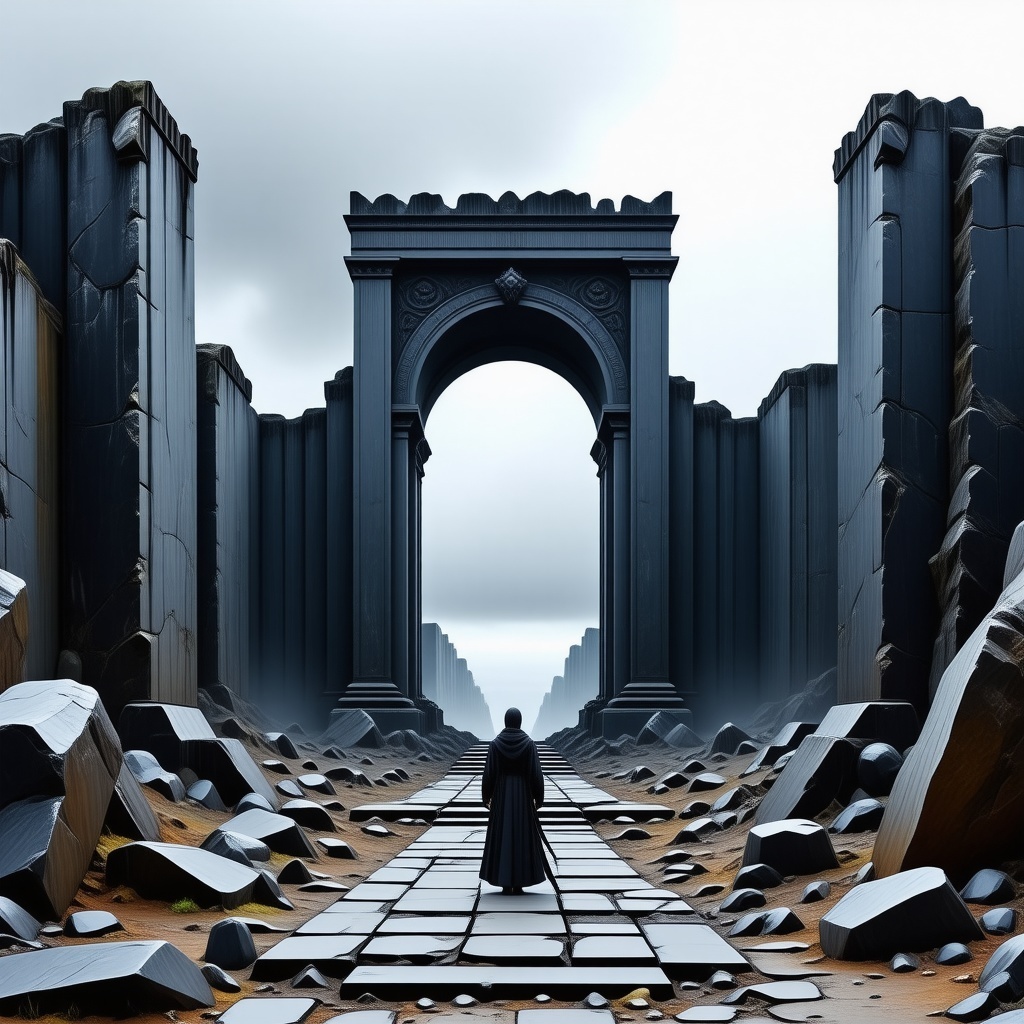Not just a rule—The Rule. Capitalized. Revered. Unspoken.
And in the city of Navara, carved between iron towers and under skies so gray they might as well have been made of stone, the Rule wasn’t just law. It was belief. It was culture. It was the thread in the fabric of every breath.
Do not speak of the Before.
Not in whispers. Not in ink. Not in dreams. Not even in the loneliest corners of the mind.
To remember was to disappear.
Everyone knew someone who had vanished. The baker’s daughter who once mumbled a lullaby that sounded suspiciously old. The postman who’d found a tattered photograph and dared ask, “Where is this?” And Mira’s own mother, who used to hum when she thought no one could hear.
That was ten years ago.
And Mira, then just a child, had said nothing. Had watched them take her mother in silence, because silence was safe. Silence was survival.
Now, Mira stood before the Archive.
A monolith of black stone buried beneath the city, hidden in the guts of a train station long sealed off, the Archive was a ghost story. A myth. But Mira had traced the tales—through coded messages in wall murals, accidental poems in graffiti, fragments of forbidden dreams.
Inside the Archive, they said, was the Before.
And she had the key.
Not a real key, of course. But a name. One she hadn’t spoken in ten years.
She inhaled. Her breath shivered.
Then she said it.
“Lyra.”
The world paused. The stones of the Archive groaned, ancient and resentful. Then the door opened.
A thousand machines stirred in the dark. Light flickered like memories—disjointed, hesitant, alive.
Mira stepped inside.
They said the Before was beautiful.
They lied.
The Before was fire.
Screens lined the walls, each playing silent footage. Buildings crumbling in slow motion. Faces contorted in panic. Fire licking skies that once had stars. Children sobbing behind barricades. Soldiers shooting into crowds.
The Before was beautiful only in the way storms are beautiful—right before they destroy everything.
Mira’s legs buckled. She leaned against a console, blinking back tears she didn’t know she still carried.
There was a voice.
Flat, automated.
“You are in violation of the Rule.”
She turned. Nothing.
“This facility is restricted.”
The screens shifted. One now displayed a live feed—of her. Standing in the Archive.
“Who’s there?” she whispered.
“You have accessed Memory Vault: Lyra-17.”
She staggered. Lyra.
The screen changed.
And there she was.
Mira’s mother. Young. Laughing. Holding Mira as a baby. Singing an old song—one Mira hadn’t heard since the silence took her.
Her knees hit the floor. She watched the memories play, hand over her mouth to keep the sobs in. Her mother twirling under golden light. Her mother standing on a stage, speaking into microphones.
“Lyra Eshari: Leader of the Resistance. Arrested Year 0. Executed.”
Mira screamed.
The Archive went black.
When she awoke, she wasn’t in the Archive.
She was in the Council Chamber.
Thirty silent figures in gray robes. Silver masks hiding their faces.
“You have broken the Rule,” said one.
Mira stood. “I saw what you didn’t want us to see.”
Another mask turned. “There is a reason.”
“There’s no reason good enough to erase history.”
Silence.
Then one said, “Do you understand what the Rule prevents?”
“I understand what it destroys.”
“You remember your mother?”
“I remember everything now.”
“That is a curse.”
Mira stepped forward. “It’s the only way to make sure we never repeat it.”
A ripple passed through the Council like wind over tall grass.
Then: “The Archive will be sealed.”
“No.” Mira’s voice rang. “The people deserve to know.”
One Councilor raised a hand. The guards stepped forward. Mira felt a chill at her neck.
“Would you sacrifice peace for truth?”
She looked at them—at the faces hidden, the voices detached, the power absolute.
“I would sacrifice silence.”
Then she whispered something.
The guards froze.
The Council trembled.
It was a name.
A true name.
Lyra.
Not a code. Not a file.
But a memory.
The name of a mother. A woman. A rebel. A voice.
And that was all it took.
The Rule cracked.
It began with whispers.
At bakeries. On rooftops. Inside classrooms when the teacher left for a moment too long.
They spoke the Before in fragments. “Did you know the sky used to be blue?” “I think I remember... music.” “There was once a thing called ‘hope.’”
The Council tried to stop it. But truth, like fire, spreads faster when it’s denied oxygen.
And Mira? She became myth.
Some said she escaped to the sea. Some said the Council imprisoned her beneath the Archive. Some believed she still walked the alleys, whispering truth to children.
But all remembered her voice.
The voice that broke the one unbreakable rule.
Ten Years Later
The city is different now.
There are still rules. But not silence.
Children learn history.
Families share stories.
There are still those who fear the Before—who flinch when old songs play, who avoid the eyes of statues raised to the fallen.
But the silence is gone.
In its place is a quiet hum.
A new song.
A beginning.
And in a little library at the edge of Navara, a girl finds an old book.
It is scorched and stitched, pages torn and ink faded. But she opens it.
And sees one sentence.
“My name was Mira Eshari, daughter of Lyra, and I remember.”
And now, so does the world.



 React
React
 React
React
 React
React
 React
React